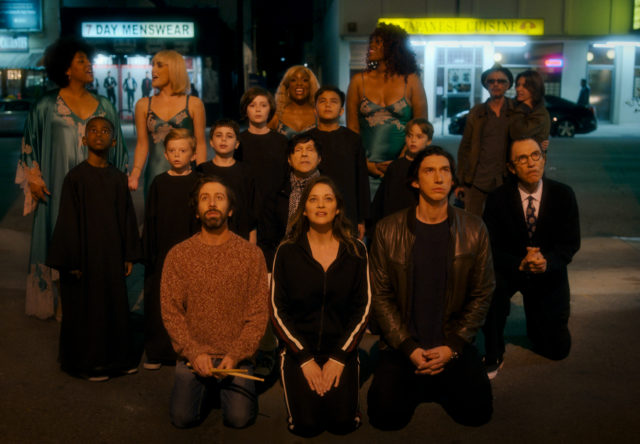Reviews include 40 Acres, Jurassic World: Rebirth, and Sorry, Baby.
TFCA Friday: Week of August 6
August 6, 2021

Welcome to TFCA Friday, a weekly round-up of film reviews and articles by TFCA members.
In Release this Week
12 Mighty Orphans (dir. Ty Roberts)
“They’re exceptional, driven players, even without shoes or uniforms. Russell’s loving kindness is new to them and they find a trusted ally and new meaning in life,” writes Anne Brodie at What She Said. “True story, my friends.”
“The film might be a tribute to a courageous band of underdogs from a time when America desperately needed fresh hope and big dreams but unfortunately, it is a terrible one,” admits Gilbert Seah at Afro Toronto.
“Sometimes researching the background of a movie proves more revealing than the film itself,” notes Liam Lacey at Original Cin. “The facts behind this competent formulaic hokum are essentially true.”
“Now, we don’t want to reinvent the game so we’re going to use some standard plays,” coaches Chris Knight at the National Post. “We’ll have slow motion, some mild cussing – sumbitch and the like – and a few scenes of victory snatched from the jaws of defeat, one of them involving intervention by President Roosevelt, played by Larry Pine. He doesn’t resemble FDR but who remembers what that sumbitch looked like anyway?”
Ailey (dir. Jamila Wignot)
“Jamila Wignot has created a lovely film about Alvin Ailey,” writes Marc Glassman at POV Magazine. “It’s a truly moving picture of a master of movement—and should be widely seen.”
Also at POV Magazine, Pat Mullen speaks with director Jamila Wignot about the impact of Alvin Ailey. “The dance that stayed with me most powerfully was Revelations, which they performed at the end,” says Wignot. “It got right to the core of me. That is something that everyone says about seeing Mr. Ailey’s work. It felt like I was watching freedom on the stage—these beautiful diverse bodies in motion. It felt like an opening, like I was leaning in the whole evening and it just stayed with me.”
At Afro Toronto, Gilbert Seah calls it “a worthy tribute to the genius artistry of choreographer Alvin Ailey, providing a look at his life and work both in dance and his activism.”
Annette (dir. Leos Carax)
“The quirky musical offerings are courtesy of brothers Ron and Russell Mael of pop duo Sparks, who also co-wrote the screenplay with Carax,” writes Peter Howell at Night Vision. “The Maels aren’t entirely at fault — and in fairness, a Sparks fan (which I’m not) may well be charmed by their contributions, which are eccentrically true to form.”
“The Sparks brothers and Carax consolidate one another’s experimental, searching, artistry perfectly, creating a dark, glamourous, beautifully photographed and gorgeously eerie study of love and the death of love,” notes Anne Brodie at What She Said. “Cotillard’s Ann and Driver’s Henry, a classical singer and stand-up comedian enjoying a good life, fame, money and each other.”
“Driver delivers a powerful, energetic performance, but the story lags a bit when Cotillard all but disappears midway through,” says Chris Knight at the National Post. “Still, it’s fascinating to watch his character slowly come unglued – not that he was that stuck together in the first place.”
“[The] film is more suited for cinephiles than for the mass commercial audience who might think everything is strange and not appreciate the enormous effort that have gone into arak’s brand of filmmaking,” observes Gilbert Seah at Toronto Franco.
“For me, the film felt like an exercise, rather than a story,” admits Karen Gordon at Original Cin. “That may be what Carax was after here, an intent to tell a story with an unlikeable lead character in a deliberately artificial way, for whatever result or reason. Perhaps it’s brave to dive into such icy waters.”
At That Shelf, Jason Gorber says, “It just becomes a little bit inane…the music’s not driving the narrative and the narrative’s not driving the music.”
“The Maels’ playful formalism and Carax’s wild conceptual swings keep negating each other – Carax’s biggest flourish simply does not work at all, and it just sits there staring us in the face for the film’s entire second half – and the fact that all the songs are built on the same formula makes Annette feel monotonous despite all the frantic activity,” sings Norm Wilner at NOW Toronto.
Dream Horse (dir. Euros Lyn)
“Dream Horse isn’t a bad film, just plain and mawkish,” admits Chris Knight at the National Post. “Its heart is in the right place, but horsey people will tell you that it takes more than that to win a race.
“[T]here’s regularly moments of salty humour to undercut the sentimentality, as the common folk – Jan in her clunky hair clip and shapeless tops, Brian with his blacked-out teeth — and their motley friends invade the private enclaves of the horsey set,” writes Liam Lacey at Original Cin. “And, for those who crave beauty, you can’t surpass the vision of a bay stallion on a green course in mid leap.”
“Triumphs and tragedies pepper the story as Dream Alliance smashes all the records. Occasional close-ups of his gentle face are magnificent, revealing a sentient creature and confirming the ancient bond between humans and horses,” notes Anne Brodie at What She Said.
“Crowd pleasing feel-good Dream Horse should entertain audiences and critics alike with its winning story and setting,” says Gilbert Seah at Afro Toronto.
“Even though one can spot all the turns before they happen, there is something warmly reassuring about Dream Horse’s familiarity. The film’s a reminder that dark clouds lift and that strength comes through adversity,” notes Pat Mullen at That Shelf. “The sense of community spirit in Dream Horse is irresistible after a year-and-half of isolation and removal from community. Cheese is its key ingredient.”
The Five Rules of Success (dir. Orson Oblowitz)
“Low budget but enterprising drama comedy follows an ex-convict as he tries to assimilate into society with what is termed The Five Rules of Success (humorously but dead serious from the perspective of the ex-convict),” notes Gilbert Seah at Afro Toronto.
Here Today (dir. Billy Crystal)
“The entire premise of Here Today is ripe for big bites of acting. (Charlie’s adult kids don’t know about his diagnosis and think his forgetfulness about family matters is just a continuation of his lifetime of being an absent dad). But really, there are only nibbles. Characters go from profoundly pissed at him to warmly understanding on a dime,” writes Jim Slotek at Original Cin.
Infinite (dir. Antoine Fuqua; August 11)
“Toss in waterboarding in a cathedral, anti-matter battles, hanging from a plane a la Air Force One, a mysterious egg, an ancient sword he hangs on to for dear life. And if you understand any of it, please enlighten me, because I am in the dark,” wonders Anne Brodie at What She Said.
John and the Hole (dir. Pascual Sisto)
“This unique story is brill on its own, but Sisto’s intimate authenticity raises it to a higher level where we are seriously morally challenged; he is aware that nature is everything,” observes Anne Brodie at What She Said. “Go see it and parents, treat your kids right or sleep with one eye open. Shotwell is transcendent as this boy with the secret interior life and iron will.”
“The film is as much about the expressive cinematography of Paul Ozgur and the minimalist music of Caterina Barberi as it is an opportunity to watch a very good quartet of actors—Charlie Shotwell, Michael C. Hall, Jennifer Ehle, Taissa Farmiga—explore the depths of a family that is a wonderful contradiction: profoundly shallow,” writes Marc Glassman at Classical FM.
Pray Away (dir. Kristine Stolakis)
“While the stories that Pray Away presents are difficult, one can’t help but find the emotional testimonials persuasive,” notes Pat Mullen at POV Magazine. “One can only respond with empathy and forgiveness, which, ironically, is the Christian thing to do.”
Rising Wolf (dir. Antaine Furlong)
“By the end of it, we are left with a faint notion that there has been an attempt to tell a story of great emotional importance,” sighs Thom Ernst at Original Cin. “But that importance, whatever it might be, fails to connect with the audience, and our hopes for a killer elevator thrill-ride plummets below sub-basement level.”
“Ends up a confusing mess that leads nowhere, yes like trapped in an elevator,” groans Gilbert Seah at Afro Toronto.
The Suicide Squad (dir. James Gunn)
“Sometimes, you just need to watch a humanoid shark tear a man in half,” cheers Barry Hertz at The Globe and Mail. “You’ll laugh, you’ll cry, you’ll barf.”
“The Suicide Squad does what its 2016 predecessor failed to do, which is find the fun in a movie about super-criminals forced to fight for the good guys,” notes Norm Wilner at NOW Toronto. “James Gunn parachutes in to bring the concept back to its comic-book origins, cranking up the absurdity, the comedy and the splatter to levels fans of Slither and Super will immediately recognize.”
“Subtle this picture ain’t,” admits Peter Howell at the Toronto Star. “Campy and horrifying by turns, it hurls so much blood and viscera onto the big screen you may feel like hosing out your eyeballs after watching it. Scene changes are indicated by giant letters spelled out with blood, fire or smoke.”
“You’re also out of luck if you’re squeamish about violence,” writes Chris Knight at the National Post. ”I lost track of the number of characters, main and background alike, who meet their ends by being slashed through the jugular, shot in the face, immolated or beheaded and consumed by King Shark, who vows not to eat his friends, but makes no promises when it comes to chums.”
“Shot partly in Panama with investment from Quebec this is a travelogue/adventure harking back to fan fiction of the 1920s updated with multiple shots at Millennials, a strong acknowledgement of empowered women, some very cool outfits and psychiatric conditions,” writes Anne Brodie at What She Said. “But what I find most interesting is its political weight, unapologetically and powerfully wagging a finger at America’s foreign activities and bad acts.”
“It’s said one definition of ‘crazy’ is repeatedly doing the same thing and expecting different results,” argues Jim Slotek at Original Cin. “Conversely, director James Gunn (Guardians of the Galaxy), given the reins of DC’s Suicide Squad franchise, has done something very different and the result is bat-guano crazy.”
The Swarm (dir. Just Philippot)
“The closeups of these insects with their ugly heads, fairy legs and compound eye give the film a really creepy making ones skin crawl,” says Gilbert Seah at Afro Toronto.
When Hitler Stole Pink Rabbit (dir. Caroline Link; Aug. 10)
“[The] horrors of Nazi Germany appear more menacing when seen from the eye of the child, Anna,” notes Gilbert Seah at Afro Toronto.
“Jojo Rabbit and its source Caging Skies owe much to When Hitler Stole Pink Rabbit,” writes Pat Mullen at That Shelf. “The children’s book by Judith Kerr is a staple on reading lists about the Holocaust, particularly for young audiences. Viewers who were ill-at-ease with the whimsy of Taika Waititi’s (wonderful) film might prefer Caroline Link’s new adaptation of Kerr’s book.”
Vivo (dir. Lin-Manuel Miranda)
“It’s an adventure! It’s an action movie! It’s the plot of Rio in reverse, I think?” wonders Norm Wilner at NOW Toronto. “That won’t matter to kids, who’ll enjoy the constant frenetic motion and the energetic songs – all written by Miranda in his signature syncopated style.”
“Songs periodically break out between chases, and Gabi and Vivo match lyrics and melody before the anti-climactic meeting with Marta and the nightclub lights of Miami,” writes Liam Lacey at Original Cin. “In the movie’s defense, the generic familiarity may prove an advantage for Vivo’s function as a babysitting tool, which Netflix can provide more consistently and cheaper than the big-screen experience.”
A Festival of Festival Coverage: Fantasia Edition
At NOW Toronto, Norm Wilner spotlights 10 films to see at Montreal’s Fantasia Festival, which has oodles of genre fare that will cater to minimalists, lapsed Catholics, really lapsed Catholics, realists, and everyone in between. Highlights include Mark O’Brien’s directorial debut The Righteous and the tender Strawberry Mansion, which’ll have audiences dreaming of fried chicken.
At POV Magazine, Courtney Small checks out the Fantasia selection Satoshi Kon: The Illusionist about the late Millennium Actress director: “Where Vincent’s film excels is in the wealth of intriguing insight that the interviews within it offer. They paint a fascinating portrait of Kon as a man and an artist. He was a genius whose gentle and compassionate persona in real-life was vastly different from the forceful, and at times disturbing, works he produced on the screen.
https://www.youtube.com/watch?v=x580mowu5Gs
TV Talk: From Patricia Rozema to Paris Hilton
At The Globe and Mail, Johanna Schneller chats with Patricia Rozema about her new series Sex/Life and forging a career telling female-driven stories in a male-dominated industry. “I remember thinking, ‘Find the right people in the U.S. to work with, but stay here,’” says Rozema. “The Canadian film industry was just forming. I could make the work I wanted to make. I knew if I stuck it out, eventually everyone would discover that gays are people, too, and that it doesn’t take a penis to tell a good story.”
At What She Said, Anne Brodie enjoys the company of Joseph Gordon-Levitt’s Mr. Corman, saying, “Mr. Corman is a complex character for American TV/streaming with a richly inquisitive mind.” Meanwhile, the return of McDonald & Dodds is “a brilliantly balanced murder mystery, character study elevated with wit and humour, twists and turns, whodunnits breezy and realistic enough to keep things real.” Also good for laughs is Cooking with Paris: “Hilton’s always been in the business of playing the fool.”



